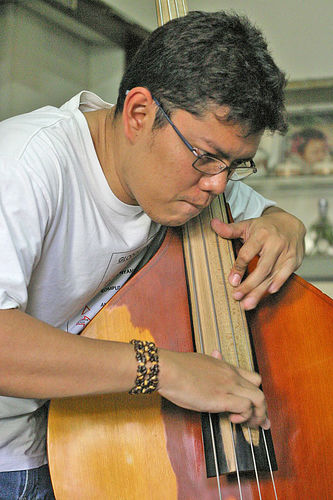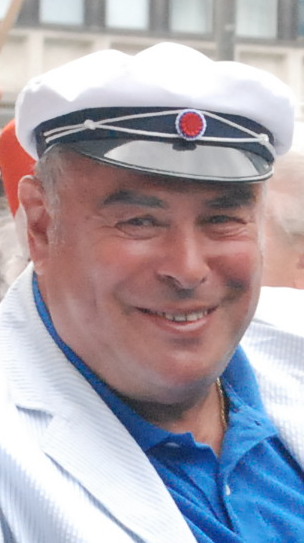|
Piano Concerto No. 2 (Rautavaara)
Einojuhani Rautavaara wrote his Piano Concerto No. 2 in 1989. The work is in three, linked movements, with the central slow movement longer than the outer movements combined. Although the work employs serial procedures, the style of piano writing is deeply rooted in the Romantic tradition combined with Rautavaara's idiosyncratic mysticism. Movements The concerto is in three linked movements, and plays for 20–25 minutes. #''In Viaggio'' #''Sognando e libero'' #''Uccelli sulle passioni'' Structure The first movement (''In Viaggio'') opens with the pianist playing soft, rippling figurations, accompanied by fragmentary calls by woodwinds. The strings then introduce a passionate theme, but the piano soon takes over the theme, which rises higher and higher. The passionate strings re-enter, with rhythmic interjections from brass and percussion, and the music rises to a climax. The piano lunges into the lowest registers, linking into the slow movement (''Sognando e libero''). The ... [...More Info...] [...Related Items...] OR: [Wikipedia] [Google] [Baidu] |
Einojuhani Rautavaara
Einojuhani Rautavaara (; 9 October 1928 – 27 July 2016) was a Finnish composer of classical music. Among the most notable Finnish composers since Jean Sibelius (1865–1957), Rautavaara wrote a List of compositions by Einojuhani Rautavaara, great number of works spanning various styles. These include eight symphony, symphonies, nine operas and twelve concertos, as well as numerous vocal and chamber music, chamber works. Having written early works using Serialism, 12-tone serial techniques, his later music may be described as neo-romantic and mystical. His major works include his Piano Concerto No. 1 (Rautavaara), first piano concerto (1969), ''Cantus Arcticus'' (1972) and his seventh symphony, Symphony No. 7 (Rautavaara), ''Angel of Light'' (1994). Life Rautavaara was born in Helsinki in 1928. His father Eino Alfred Rautavaara (né Jernberg; 1876–1939; he changed his last name in 1901) was an opera singer and cantor, and his mother Elsa Katariina Rautavaara (née Teräskeli; o ... [...More Info...] [...Related Items...] OR: [Wikipedia] [Google] [Baidu] |
Pizzicato
Pizzicato (, ; translated as "pinched", and sometimes roughly as "plucked") is a playing technique that involves plucking the strings of a string instrument. The exact technique varies somewhat depending on the type of instrument : * On bowed string instruments it is a method of playing by plucking the strings with the fingers, rather than using the bow. This produces a very different sound from bowing, short and percussive rather than sustained. * On keyboard string instruments, such as the piano, pizzicato may be employed (although rarely seen in traditional repertoire, this technique has been normalized in contemporary music, with ample examples by George Crumb, Toru Takemitsu, Helmut Lachenmann, and others) as one of the variety of techniques involving direct manipulation of the strings known collectively as "string piano". * On the guitar, it is a muted form of plucking, which bears an audible resemblance to pizzicato on a bowed string instrument with its relatively short ... [...More Info...] [...Related Items...] OR: [Wikipedia] [Google] [Baidu] |
Concertos By Einojuhani Rautavaara
A concerto (; plural ''concertos'', or ''concerti'' from the Italian plural) is, from the late Baroque era, mostly understood as an instrumental composition, written for one or more soloists accompanied by an orchestra or other ensemble. The typical three-movement structure, a slow movement (e.g., lento or adagio) preceded and followed by fast movements (e.g. presto or allegro), became a standard from the early 18th century. The concerto originated as a genre of vocal music in the late 16th century: the instrumental variant appeared around a century later, when Italians such as Giuseppe Torelli started to publish their concertos. A few decades later, Venetian composers, such as Antonio Vivaldi, had written hundreds of violin concertos, while also producing solo concertos for other instruments such as a cello or a woodwind instrument, and concerti grossi for a group of soloists. The first keyboard concertos, such as George Frideric Handel's organ concertos and Johann ... [...More Info...] [...Related Items...] OR: [Wikipedia] [Google] [Baidu] |
Ondine (record Label)
Ondine is a Finnish classical record label founded in 1985 in Helsinki, Finland. Its catalogue with several award-winning releases includes over 600 titles with major Finnish and international artists. Ondine's roster of artists and ensembles include conductor and pianist Christoph Eschenbach, conductors Hannu Lintu, Robert Trevino, Vladimir Ashkenazy, Olari Elts, Jaime Martín, Esa-Pekka Salonen, Jukka-Pekka Saraste, Sakari Oramo, Leif Segerstam, John Storgårds and Mikko Franck, orchestras such as The Philadelphia Orchestra, the Orchestre de Paris, the Finnish Radio Symphony Orchestra, Malmö Symphony Orchestra, Royal Northern Sinfonia, the London Sinfonietta, the BBC Symphony Orchestra, the Los Angeles Philharmonic, the Czech Philharmonic, Estonian National Symphony Orchestra, Tallinn Chamber Orchestra, Lapland Chamber Orchestra, Latvian National Symphony Orchestra, Lithuanian National Symphony Orchestra and the Helsinki Philharmonic, Tetzlaff String Quartet, Latvian Radio Cho ... [...More Info...] [...Related Items...] OR: [Wikipedia] [Google] [Baidu] |
Max Pommer
Max Pommer (born 9 February 1936) is a German musicologist and conductor, a director of the Leipziger Universitätschor and the founder and conductor of the Neues Bachisches Collegium Musicum. Career Born in Leipzig, Pommer was a student of the Thomasschule in his home town, where he founded a chamber orchestra. He studied conducting and piano at the Musikhochschule Leipzig, and from 1960 to 1964 also musicology at the Leipzig University. He was the conductor of the Leipziger Universitätschor from 1973 to 1987. He founded in 1979 the Neues Bachisches Collegium Musicum, formed by players of the Gewandhausorchester, which gained him international recognition and awards. In 1980, he was appointed professor at the Leipzig University. From 1987 to 1991, Pommer was Generalmusikdirektor of the MDR Sinfonieorchester. He was the conductor of the from 2001 to 2011, when he celebrated his 75th birthday.Pressestelle des Senats''Senator-Biermann-Ratjen-Medaille an Max Pommer. Behörde ... [...More Info...] [...Related Items...] OR: [Wikipedia] [Google] [Baidu] |
Leipzig Radio Symphony Orchestra
The MDR-Sinfonieorchester (in English, MDR Leipzig Radio Symphony Orchestra) is a German radio orchestra based in Leipzig. It is the radio orchestra of Mitteldeutscher Rundfunk, the public broadcaster for the German states of Thuringia, Saxony and Saxony-Anhalt. It is one of the oldest Radio orchestras in the world and the oldest in Germany. It was founded in Leipzig, Germany in 1923 (9 months earlier than the Berlin Radio Symphony Orchestra). Apart from a short interruption during World War II, it has been the main orchestra of the Central German Broadcasting Company (MDR) since 1924. The orchestra performs concerts in Leipzig at the Gewandhaus. History The orchestra was founded as "Orchester des Konzertvereins" ("Orchestra of the Concert Society"). It became the "Rundfunk-Sinfonieorchester Leipzig" ("Radio Symphony Orchestra Leipzig") in 1924 and later adopted its present name. The Orchestra was dissolved during World War II and reunited in 1946 under the tenure of the co ... [...More Info...] [...Related Items...] OR: [Wikipedia] [Google] [Baidu] |
Ralf Gothoni
Ralph (pronounced ; or ,) is a male given name of English, Scottish and Irish origin, derived from the Old English ''Rædwulf'' and Radulf, cognate with the Old Norse ''Raðulfr'' (''rað'' "counsel" and ''ulfr'' "wolf"). The most common forms are: * Ralph, the common variant form in English, which takes either of the given pronunciations. * Rafe, variant form which is less common; this spelling is always pronounced , as are all other English spellings without "l". * Raife, a very rare variant. * Raif, a very rare variant. Raif Rackstraw from H.M.S. Pinafore * Ralf, the traditional variant form in Dutch, German, Swedish, and Polish. * Ralfs, the traditional variant form in Latvian. * Raoul, the traditional variant form in French. * Raúl, the traditional variant form in Spanish. * Raul, the traditional variant form in Portuguese and Italian. * Raül, the traditional variant form in Catalan. * Rádhulbh, the traditional variant form in Irish. Given name Middle Ages * Ral ... [...More Info...] [...Related Items...] OR: [Wikipedia] [Google] [Baidu] |
Naxos Records
Naxos comprises numerous companies, divisions, imprints, and labels specializing in classical music but also audiobooks and other genres. The premier label is Naxos Records which focuses on classical music. Naxos Musical Group encompasses about 17 labels including Naxos Records, Naxos Audiobooks, and Naxos Books (ebooks). There are about an additional 50 labels that are independent of the Naxos Musical Group with a wide range of offerings. The company was founded in 1987 by Klaus Heymann, a German-born resident of Hong Kong. Naxos Records Naxos Records is a record label specializing in classical music. The company was known for its budget pricing of discs, with simpler artwork and design than most other labels. In the 1980s, Naxos primarily recorded central and eastern European symphony orchestras, often with lesser-known conductors, as well as upcoming and unknown musicians, to minimize recording costs and maintain its budget prices. In more recent years, Naxos has taken advan ... [...More Info...] [...Related Items...] OR: [Wikipedia] [Google] [Baidu] |
Eri Klas
Eri Klas (7 June 1939 – 26 February 2016) was an Estonian conductor. Klas was born into a Jewish family in Tallinn. His mother was pianist Anna Klas. His father, Eduard Klas, was killed in 1941, during the Holocaust.''Eesti Entsüklopeedia'', vol. 14, p. 167. (Tallinn, 2000.) Klas mainly worked in the Nordic scene, but might be best remembered for his work leading the now defunct Netherlands Radio Symphony Orchestra. From 1999 to 2001 Klas was music advisor to the Israel Sinfonietta Beersheba, Israel. He premiered Alfred Schnittke's 1st Cello Concerto (Munich Philharmonic, 1986) and Peer Gynt ballet ( Hamburg State Opera, 1989), and worked on the diffusion of the Estonian symphonic repertory. Klas was also active as a pedagogue, holding professorships at the Sibelius Academy (1993–97) and the Estonian Academy of Music and Theatre (1997 until his death), where he received an honorary doctorate. Klas was decorated with the Order of the Lion of Finland (1992, on the occasi ... [...More Info...] [...Related Items...] OR: [Wikipedia] [Google] [Baidu] |


